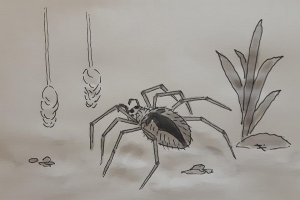Difference between revisions of "Daggerback"
From World of Entorais Wiki
Jump to navigationJump to search (→Description: content) |
(→Stories: link) |
||
| Line 32: | Line 32: | ||
==Stories== | ==Stories== | ||
<div style="column-count:3;-moz-column-count:3;-webkit-column-count:3"> | <div style="column-count:3;-moz-column-count:3;-webkit-column-count:3"> | ||
: | :[[Save (fifty word fantasy)]] | ||
</div> | </div> | ||
==See Also== | ==See Also== | ||
:<!--links to related material--> | :<!--links to related material--> | ||
Revision as of 15:13, 27 November 2021
About
- Common Names
- Daggerback, Larder Spider
- Classification
- Arthropod
- A species of ground dwelling hunting spider with a hairy body except for the namesake black dagger shape on its back.
Description
- Size
- Males < 2 centimetres (1 inch);Females 4-7 centimetres (2-3 inches) diameter, includes legs
- Appearance
- A light brown or grey hairy bodied spider with a distinct smooth hairless black dagger shape on the top side of their abdomen.
- Sexual Dimorphism
- Females grow 2-3 times the size of males. Male may lack a significant dagger marking, some just have a dark line or two.
- Variance
- None
Ecology
- Habitat
- Woodlands, grasslands, scrub. Tropical to Temperate latitudes.
- Diet
- Insects, snails, worms, small amphibians.
- When successful in hunting, these spiders cocoon their paralyzed prey and hang them from silk strands in a central larder beneath leafy bushes and small shrubs.
Behaviour
- Social Grouping
- Solitary
- Temperament
- Aggressive
- Intelligence
- Animal
- Reproduction
- Males will seek out female and approach cautiously for a chance to engage in sex. If receptive the female will allow the male to enter her larder. If not receptive, the male will be added to the larder. females will lay a clutch of eggs wrapped in silk and bundled alongside their food reserves. When these hatch the young are left on their own.
- Venom
- Daggerbacks are venomous, but not particularly dangerous to treahni or larger animals with the exception of the very young, or those with a frail constitution.
Sub-Species
Domestication
- General
- No efforts to domesticate this species.
- Resources
- None.
